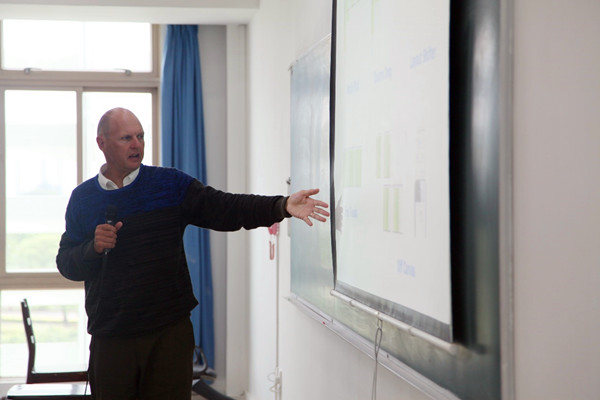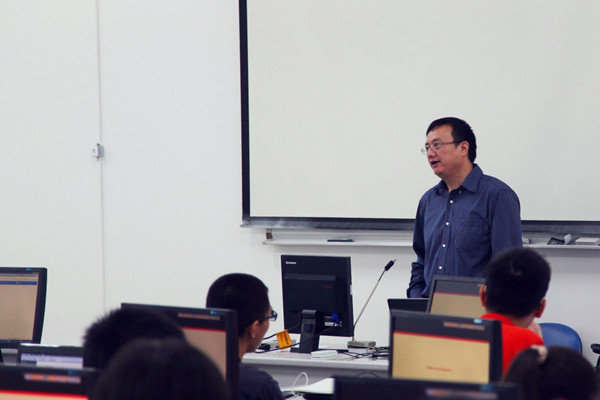移动信息工程学院在夏季学期开展本科生强化课程教学
为了营造珠海校区的工程教育氛围,移动信息工程学院在夏季学期开展本科生强化课程(Summer Intensive Courses)教学。学院专门邀请海外师资及业界专家为本科生讲授自动控制系统、传感器和物联网的设计与实现、安全关键系统开发、智能硬件导论、移动通讯原理等5门强化课程。

德国德累斯顿大学Alexander Schill教授为2012级本科生授课

Xilinx公司大学计划亚太区经理谢凯年博士为2012级本科生授课
课程介绍:
1、课程:Automatic Control Systems 自动控制系统
授课教师:Prof.Cishen Zhang (School of Software and Electrical Engineering, Swinburne University of Technology, Australia)
课程简介:This course presents fundamental classical methods for the analysis and design of continuous time single-input single output control systems. It covers modelling of dynamical systems, time domain and frequency domain properties of control systems, frequency domain compensation of control systems and PID control. It also introduces to students the simulation software MATLAB for numerical analysis and design of control systems. On completion of this course, students should be able to apply the classical control methods and MATLAB tools to solve basic control system modelling, analysis and design problems.
2、课程:Design and Implementation of Sensor & Cyber-physical Network 传感器和物联网的设计与实现
授课教师:Prof. David K. Y. Yau (SingaporeUniversityof Technology and Design,Singapore)
课程简介:Cyber-physical networks overlay cyber (digital) communication and control on traditional physical (analog) infrastructures such as power grids and transport systems. The ICT overlay imparts intelligence, situation awareness, and agile response to improve the robustness and performance of the physical systems. This course will cover design principles and techniques for the construction of robust, energy-efficient, and high-performance cyber-physical networks. Topics include: game theory; pursuit-evasion in an adversarial setting; localization, identification, and tracking problems; energy-efficient mobile coverage with optimal quality of monitoring (QoM); optimal QoM by high-density network sensing; and emerging applications such as smart grids. The course will also feature a hands-on sensing project on Android smartphones.
3、课程:Safty-Critical Systems Development 安全关键系统开发
授课教师:Prof. Chris Johnson (School of Computing Science, University of Glasgow, UK)
课程介绍:Computers control many of the systems that protect us from death and injury. Automatic braking systems are intended to reduce the risks of car accidents. Medical imaging systems help in the diagnosis of diseases. Even the programs that control our microwave cookers help to protect us from exposure to radiation.This course will equip students with an initial understanding of the tools and techniques that are being used to aid the development of safety-critical systems. An initial analysis of previous failures will work through current attempts to standardise 'best practice'. We will then look at the problems that complicate the design of safety-critical systems.This module encourages student's to apply software and hardware engineering techniques, learnt in other areas of the course, to support the development of safety-critical applications. It also encourages students to consider the particular methodological and professional issues that surround the development of safety-critical systems.
4、课程:Introduction to Intelligent Hardware 智能硬件导论
授课教师:Dr. Kelvin Xie (Xilinx公司大学计划亚太区经理)
课程简介:This course will introduce how to apply Xilinx Zynq-7000 SoC on popular embedded operating system platform to implement Wechat-based home smart application during five teaching days.While hardware part includes ARM processor configuration and FPGA programmable logic IP design, software part includes cross environment structures, and SDK application, compile operation of the open source Linux Ubuntu system, application development and the third party software compilation and operation, and network setting and remote access. Participants can personally practice how to build an embedded system step by step in terms of both hardware and software.
5、课程:Principles of Mobile Communication 移动通信原理
授课教师: Prof. Alexander Schill(Technical University of Dresden, Germany )
课程简介:This course covers the fundamentals of wireless mobile communications systems. The topics cover radio propagation, digital modulation, and error control; access methods: spread spectrum, FDMA and TDMA; antenna diversity, multi-input multi-output systems. This course also provides students with a comprehensive knowledge of GSM, TDMA, CDMA, OFDM (A); 3G/4G wireless cellular telephony, cellular data, cellular multimedia and wireless LAN, wireless PAN, Wireless MAN and fixed wireless.

